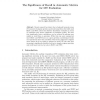119 search results - page 2 / 24 » Better Evaluation Metrics Lead to Better Machine Translation |
EMNLP
2009
13 years 2 months ago
2009
Binarization of Synchronous Context Free Grammars (SCFG) is essential for achieving polynomial time complexity of decoding for SCFG parsing based machine translation systems. In t...
ACL
2011
2011
Better Hypothesis Testing for Statistical Machine Translation: Controlling for Optimizer Instability
12 years 8 months ago
In statistical machine translation, a researcher seeks to determine whether some innovation (e.g., a new feature, model, or inference algorithm) improves translation quality in co...
EMNLP
2006
13 years 6 months ago
2006
In this paper, we present ParaEval, an automatic evaluation framework that uses paraphrases to improve the quality of machine translation evaluations. Previous work has focused on...
ACL
2012
11 years 7 months ago
2012
Many machine translation (MT) evaluation metrics have been shown to correlate better with human judgment than BLEU. In principle, tuning on these metrics should yield better syste...
AMTA
2004
Springer
13 years 8 months ago
2004
Springer
Recent research has shown that a balanced harmonic mean (F1 measure) of unigram precision and recall outperforms the widely used BLEU and NIST metrics for Machine Translation evalu...

